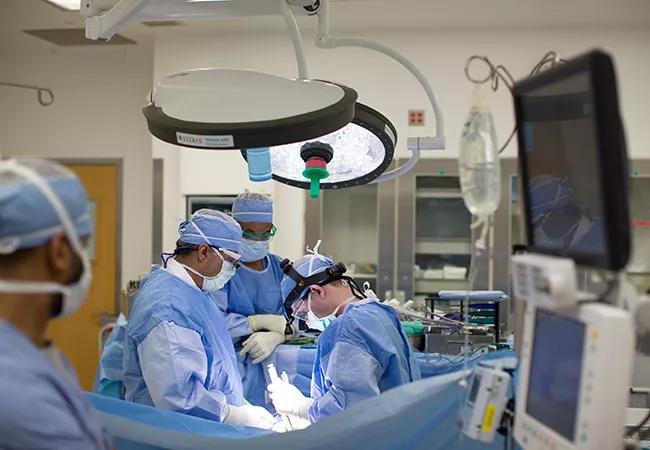Q&A with the director of Cleveland Clinic’s distinctive spine surgery fellowship

Image content: This image is available to view online.
View image online (https://assets.clevelandclinic.org/transform/b0763a0d-1c5d-40ab-8d41-ffa15ea579ff/17-NEU-4031-Savage-650x450_jpg)
17-NEU-4031-Savage-650×450
For the lowdown on a “hybrid” orthopaedic/neurosurgical spine surgery fellowship, there’s no better place to turn than the graduates of such a program themselves:
Advertisement
Cleveland Clinic is a non-profit academic medical center. Advertising on our site helps support our mission. We do not endorse non-Cleveland Clinic products or services. Policy
Those are a few of many testimonials from graduates of Cleveland Clinic’s Spine Surgery Fellowship, the only hybrid fellowship program of its kind in the U.S. — i.e., the only program combining extensive and complementary spine surgery training from both neurosurgical and orthopaedic perspectives.
In practice, that translates to didactic lectures and hands-on instruction from a core faculty of four fellowship-trained orthopaedic spine surgeons and five fellowship-trained neurosurgeons, which gives the fellows exposure to the broadest range of spinal pathologies and treatments. The fellows also have the opportunity to work with orthopaedic and neurosurgery spine staff at Cleveland Clinic’s regional hospitals and at Cleveland’s MetroHealth Medical Center.
Each year, the program’s faculty members pick five or six spine surgery fellows from a pool of 100 or more applicants to spend a year at Cleveland Clinic. The fellows — themselves a mix of orthopaedic surgeons and neurosurgeons — participate in a good share of the 1,900 spine surgeries performed at Cleveland Clinic each year, working on cases that involve degenerative disease, infection, intra- and extradural tumors, spinal deformity, trauma and more.
Consult QD caught up with fellowship program director Jason Savage, MD, a surgeon in Cleveland Clinic’s Center for Spine Health and Department of Orthopaedic Surgery, to learn how this program differs from its non-hybrid counterparts.
Q: How does the hybrid nature of this program change the educational experience for fellows relative to other spine surgery programs?
Advertisement
A: The fellowship’s hybrid nature is the strongest and most unique aspect of the training program. Fellows get to work with both orthopaedic and neurological spine surgeons, giving them a huge breadth of experience and knowledge. The neurosurgery fellows get exposure to complex deformity surgery for conditions such as idiopathic and degenerative scoliosis, which they may not otherwise receive, and the orthopaedic fellows learn about working in and around the dura surrounding the spinal cord. All fellows are presented with many different ways to think about and treat a problem, which leaves them with excellent clinical judgment and technical skills for broad surgical indications when they’ve completed the program.
The fellows also learn from one another, which is extra valuable since they collectively have such a wide base of prior training. Orthopaedic surgery and neurosurgery are certainly two different cultures, yet here everyone mixes together with great camaraderie, and that opens the door to new opportunities. For instance, many of our orthopaedic fellows attend the neurosurgical society meetings, and vice versa. This gives them exposure to new ideas and more opportunities to present at meetings and be published in various neurosurgical and orthopaedic spine journals.
Q: Are other elements of this fellowship distinctive, beyond the hybrid aspect?
A: Our fellows spend a two-month rotation at Cleveland’s MetroHealth Medical Center, a very busy level I trauma center. This experience tends to be one of the fellows’ favorite and most educational rotations of the year. They spend most of their time with two orthopaedic spine surgeons who are experts in spine trauma, and they also get to work with two outstanding neurosurgeons who have busy clinical practices. Most spine fellowships have some trauma built into the program, but it’s unusual to have a dedicated experience like ours where fellows deal with a high volume of spine trauma over an 8- to 10-week period.
Advertisement
Additionally, we also run an excellent nonoperative spine medicine fellowship program, and our spine surgery fellows interact closely with that program to optimize the educational experience.
Q: What are the most common practice settings that graduates move on to?
A: We usually have a good mix between fellows who go into academic practice and those who go into private practice. This fellowship prepares you well for both. It’s definitely great for those interested in academia, as all faculty are very busy academically, giving talks, teaching, publishing and doing research.
One of our faculty members, Center for Spine Health Director Thomas Mroz, MD, spearheaded Cleveland Clinic’s distinctive Spine Research Laboratory, so our fellows have that infrastructure in place to pursue research if they wish. The research there follows our hybrid learning model: There’s seamless integration between the orthopaedic and neurosurgical staff, with collaboration on every research project done in the lab. Most research focuses on clinical outcomes, and topics vary from cervical myelopathy to adult spinal deformity to osteobiologics to value-based healthcare.
Q: How should spine surgery fellowships be changing to keep pace with technology and the evolving healthcare landscape?
A: I can share a few things our program is doing on those fronts. For one, we often use intraoperative navigation, which allows us to employ minimally invasive techniques and operate with improved accuracy. To keep current with trends toward outcomes and value-based care, we’ve added lectures on cost-effectiveness in healthcare and outcomes-based research. Finally, we hope to soon add a bioskills curriculum in which fellows and other trainees will practice surgical skills on 3-D-printed spine models.
Advertisement
Advertisement
Guidance from the largest cohort of SEEG-confirmed insular epilepsy patients reported to date
Ethical guidance provides guardrails so medical advances benefit patients
OCEANIC-STROKE results represent long-sought advance in secondary stroke prevention
Two studies from Cleveland Clinic may help advance the technology toward broader clinical use
Distinct MRI signature includes lesions beyond the corpus callosum, features predictive of vision and hearing loss
An argument for clarifying the nomenclature
An expert talks through the benefits, limits and unresolved questions of an evolving technology
Recommendations on identifying and managing neurodevelopmental and related challenges